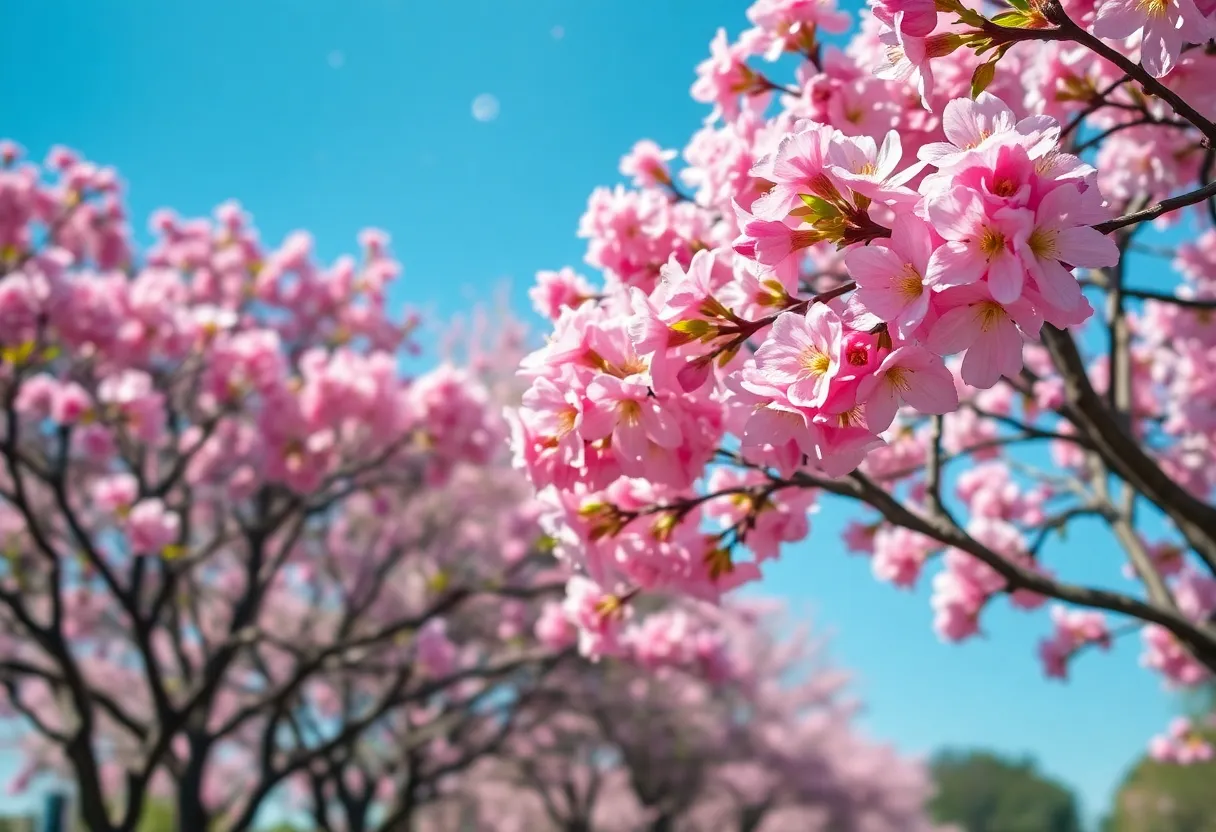News Summary
Springtime in Tallahassee brings beautiful blooms and the unwelcome companion of tree pollen. Residents face allergic reactions like sneezing and congestion due to lightweight, wind-pollinated trees like Eastern Red Cedar and Oaks. Expert tips for managing exposure and information on allergy-triggering trees help make the season more bearable.
Spring Allergy Season in Tallahassee: Tree Pollen and Its Impact on Residents
Ah, springtime in Tallahassee! The sun shines brightly, flowers are blooming, and the sweet sound of birds singing fills the air. It sounds perfect, doesn’t it? But hang on a second—there’s a little catch! With all that beauty comes the not-so-wonderful companion: pollen. As those lovely azaleas and flowering trees bloom, they release clouds of pollen that settle on everything from pathways to benches to the picturesque Lake Ella.
It’s not just nature’s beauty that affects us, though; many residents find themselves battling allergic reactions with symptoms like sneezing, congestion, and those oh-so-annoying itchy eyes. Pollen is often referred to as “nature’s glitter” because it’s everywhere and can make life sparkle—or at least, feel it. This glitter, while pretty in the air, can be a real nuisance when we breathe it in.
The Real Culprits of Spring Allergies
You might be thinking that it’s those colorful flowering trees that are the biggest offenders, but they actually have a twist! Many of them depend on insect pollination, which means their pollen is heavy and doesn’t travel too far. Instead, the real troublemakers are wind-pollinated trees. These sneaky trees release lightweight pollen that can drift for miles, affecting many unsuspecting allergy sufferers.
Interestingly, the amount of pollen produced can change each year, thanks in part to the weather. Windy days? Expect pollen to spread far and wide. Rain? That’s a natural rinse that can lessen the pollen count. A mild winter can even kick-start the allergy season earlier than usual, and sometimes, it can stretch it longer. So, what can you expect this season?
The Top Allergy-Triggering Trees
Each spring, certain trees tend to be the main culprits for allergies, as listed by the Ogren Plant-Allergy Scale (OPALS). Here’s a rundown of the top offenders in Tallahassee:
- Eastern Red Cedar: An OPALS rating of 10! This tree produces fine airborne pollen that causes what some call “Cedar Fever” from December to February.
- Oaks: With an OPALS rating of 8, these trees release light, airborne pollen from February to May that affects even those far away.
- Hickory and Pecan Trees: They share an OPALS rating of 8 and unleash massive pollen from March to May, triggering strong reactions in many.
- Sweetgum Trees: Despite their OPALS rating of 7 and a pollen season from March to May, they make our fall colorful while also causing allergies.
- Pine Trees: These trees have an OPALS rating of 4. From February to April, their visible pollen may lead to less allergenic reactions for many since it’s heavier.
- Red Maples: With an OPALS rating of 9, these trees bloom in late winter, often causing early allergy symptoms.
- American Elm: An OPALS rating of 8 means they contribute to spring allergies, especially along older streets and parks.
- Bald Cypress: Also rated 8, these thrive in wetlands, releasing plenty of pollen during the spring.
- Sycamores: These are common park trees with an OPALS rating of 9, producing abundant pollen that affects many.
Managing Pollen Exposure
Now that you know who the primary polluters are, how can you stay comfortable during allergy season? Here are some helpful tips:
- Stay Informed: Check the pollen forecasts regularly.
- Timing is Key: Try to limit outdoor activities on high-pollen days.
- Keep It Closed: Close windows to keep pollen out of your home.
- Clean Up: Shower after being outside to wash off any pollen.
If you’re considering landscaping your own yard, think about opting for low-pollen or female trees. This may help you enjoy your outdoor spaces without the struggles of allergies!
Knowledge is Power
For more information on trees and their allergenic effects, take a look at the UF/IFAS Extension publication on “Urban Trees and Allergies in North Florida.” Being educated can help make this spring season a joyful—and less sneezy—experience for everyone!
Deeper Dive: News & Info About This Topic
HERE Resources
Additional Resources
- Tallahassee.com: Why Tallahassee Turns Yellow
- Weather.com: Gainesville Weather
- WTXL: Allergy Season in Big Bend
- Click Orlando: Peak Pollen Problems
- Encyclopedia Britannica: Allergies

Author: STAFF HERE TALLAHASSEE WRITER
The TALLAHASSEE STAFF WRITER represents the experienced team at HERETallahassee.com, your go-to source for actionable local news and information in Tallahassee, Leon County, and beyond. Specializing in "news you can use," we cover essential topics like product reviews for personal and business needs, local business directories, politics, real estate trends, neighborhood insights, and state news affecting the area—with deep expertise drawn from years of dedicated reporting and strong community input, including local press releases and business updates. We deliver top reporting on high-value events such as Springtime Tallahassee, Tallahassee Jazz & Blues Festival, and LeMoyne Chain of Parks Art Festival. Our coverage extends to key organizations like the Greater Tallahassee Chamber of Commerce and United Way of the Big Bend, plus leading businesses in education, healthcare, and insurance that power the local economy such as Florida State University, Tallahassee Memorial HealthCare, and Capital Health Plan. As part of the broader HERE network, including HEREJacksonville.com, HEREOrlando.com, HEREStPetersburg.com, and HERETampa.com, we provide comprehensive, credible insights into Florida's dynamic landscape.


